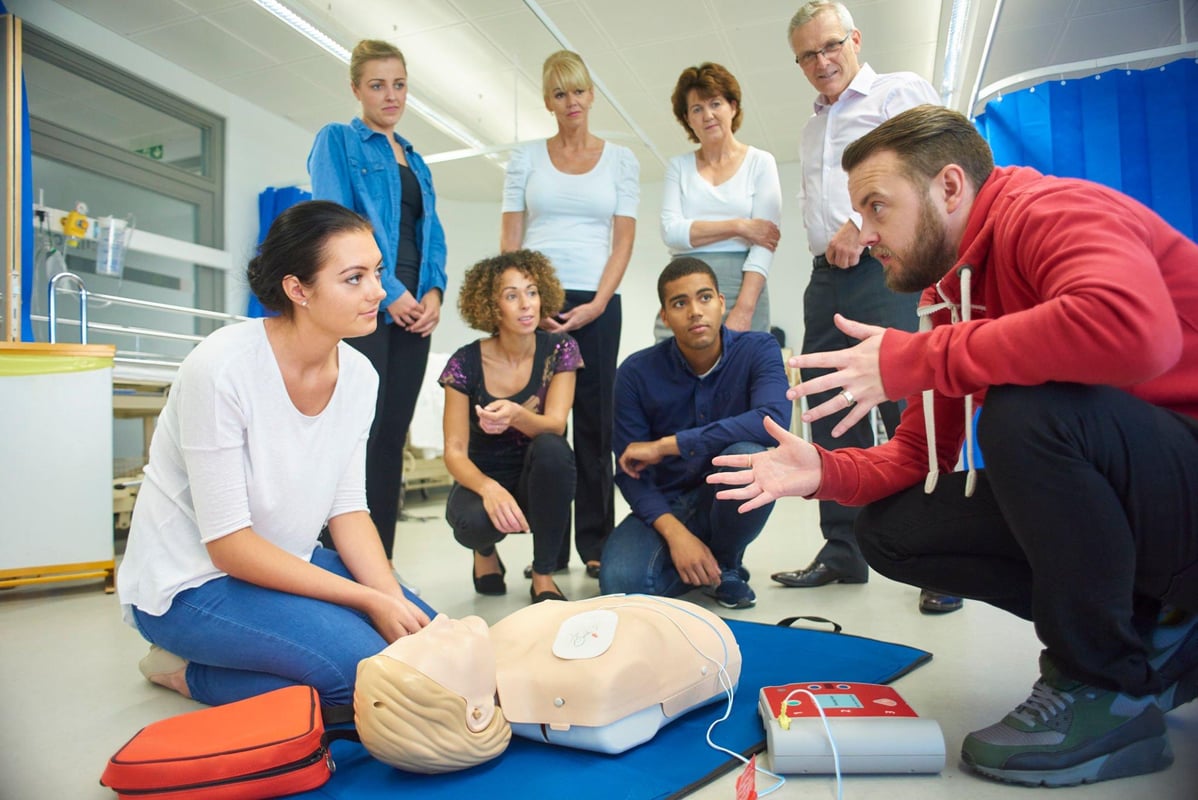
$191 to start
$2,200 total

Financial aid (may be available)

Financial aid (may be available)

$239 to start
$4,000 total
No cost info
No cost info
$1,300 total
$125 total
$85 total
No cost info
No cost info
No cost info
$36.50 total
No cost info
First aid is an essential skill, and the demand for trained first aiders is ever-increasing. If you're located in Miami and are looking for first aid classes, you're in the right place. This blog post will provide you with all the information you need to find the perfect class.

First aid is the immediate care given to a person who has been injured or suddenly becomes ill. It includes self-help and home care if medical assistance is not available or delayed. It's a set of simple, life-saving procedures that an individual can be trained to perform with minimal equipment.
Becoming a certified first aider requires specific training, which varies depending on the complexity of the tasks one is expected to perform. However, there are common requirements:
Basic knowledge of first aid principles and emergency protocols.
Understanding how to assess a patient's condition.
Ability to perform cardiopulmonary resuscitation (CPR).
Knowledge of how to dress wounds and control bleeding.
When searching for a first aid class, consider the following:
Accreditation: The course should be accredited by a recognized health or education authority.
Coverage: It should cover a wide range of topics, including how to handle emergencies, wound care, and CPR.
Practical Training: The class should offer ample opportunities for practical training. Real-life scenarios and hands-on training are crucial for effective learning.
Qualified Instructors: Ensure that the course is taught by experienced and qualified instructors.
First aid classes often involve a combination of theoretical lessons and practical sessions. Here's what you can expect:
Lectures on first aid principles, techniques, and procedures.
Demonstrations by instructors.
Hands-on practice, including CPR dummies and wound dressing.
The certification process typically involves the following steps:
Completion of coursework: This includes attending all classes and completing any assignments or practical sessions.
Assessment: You'll need to pass an assessment, usually consisting of a written exam and a practical test.
Certification: Once you've passed the assessment, you'll receive your first aid certification. Remember to renew it regularly as required by the certifying body.
Once you're a certified first aider, you can find related jobs in various sectors, including healthcare, education, and corporate. Some job titles might include First Aid Officer, School Nurse, or Health and Safety Officer. You can find these opportunities on job search websites, or through networks and referrals.
After becoming a certified first aider, you might consider taking additional classes to enhance your skills and broaden your job prospects. Some options include:
Emergency Medical Technician (EMT) Training: This equips you with skills to handle medical emergencies in pre-hospital settings.
Certified Nursing Assistant (CNA) Training: This prepares you for a career in nursing, where your first aid skills will be of great value.
Home Health Aide Training: This trains you to provide care in home settings, a growing field in healthcare.
First aid skills are not only essential in healthcare settings but also in workplaces. They can make a significant difference in managing emergencies before professional help arrives. Some benefits of having trained first aiders in workplaces include:
Ensuring a safer environment: They can identify potential hazards and take steps to prevent accidents.
Saving lives: In the event of a serious accident, immediate first aid can save lives.
Reducing recovery time: Prompt and appropriate first aid can help reduce a person's recovery time.
First aid for children and infants is slightly different from that for adults, with certain techniques requiring modifications. Therefore, if you work or live with children, it's beneficial to take a class focusing on pediatric first aid.
A well-stocked first aid kit is crucial in handling emergencies. Some essentials include bandages, antiseptic wipes, tweezers, medical tape, disposable gloves, and a breathing barrier for performing CPR.
In disaster situations, professional medical help may be delayed. Hence, knowing first aid can be life-saving. This includes understanding how to perform CPR, treat burns, and manage fractures and wounds.
First aid is an invaluable skill that everyone should consider learning. It not only equips you to handle emergencies but also opens up numerous job opportunities. If you're in Miami and looking for first aid classes, be sure to consider the factors mentioned in this post. Remember, the skills you learn could one day save a life.
Dreambound has an extensive collection of guides that dive deep into how to get started in the field, tailored for various cities. For those based in different locations or planning to move, we recommend exploring our other guides.
If you're exploring various professional paths, Dreambound has in-depth guides to help assist you. Explore a few of these resources below.
Dreambound's platform allows prospective students to find the right educational program for them through searching, filtering, and connecting with our extensive selection of career & technical education partners.
Dreambound has over 70 programs across healthcare, technology, business, and industrial trades. This includes programs such as Medical Billing, Cybersecurity, and welding.
Some of our schools offer financial aid for those who qualify. Many others offer payment plans, where you can pay the cost of class over time.
Yes, Dreambound offers many online programs. On Dreambound's search, you can filter by online, in-person, and hybrid (part online, part in-person).
Dreambound is completely free for you to use! We are supported by schools and organizations who pay to advertise on our website, so we can offer all of our career resources for free.